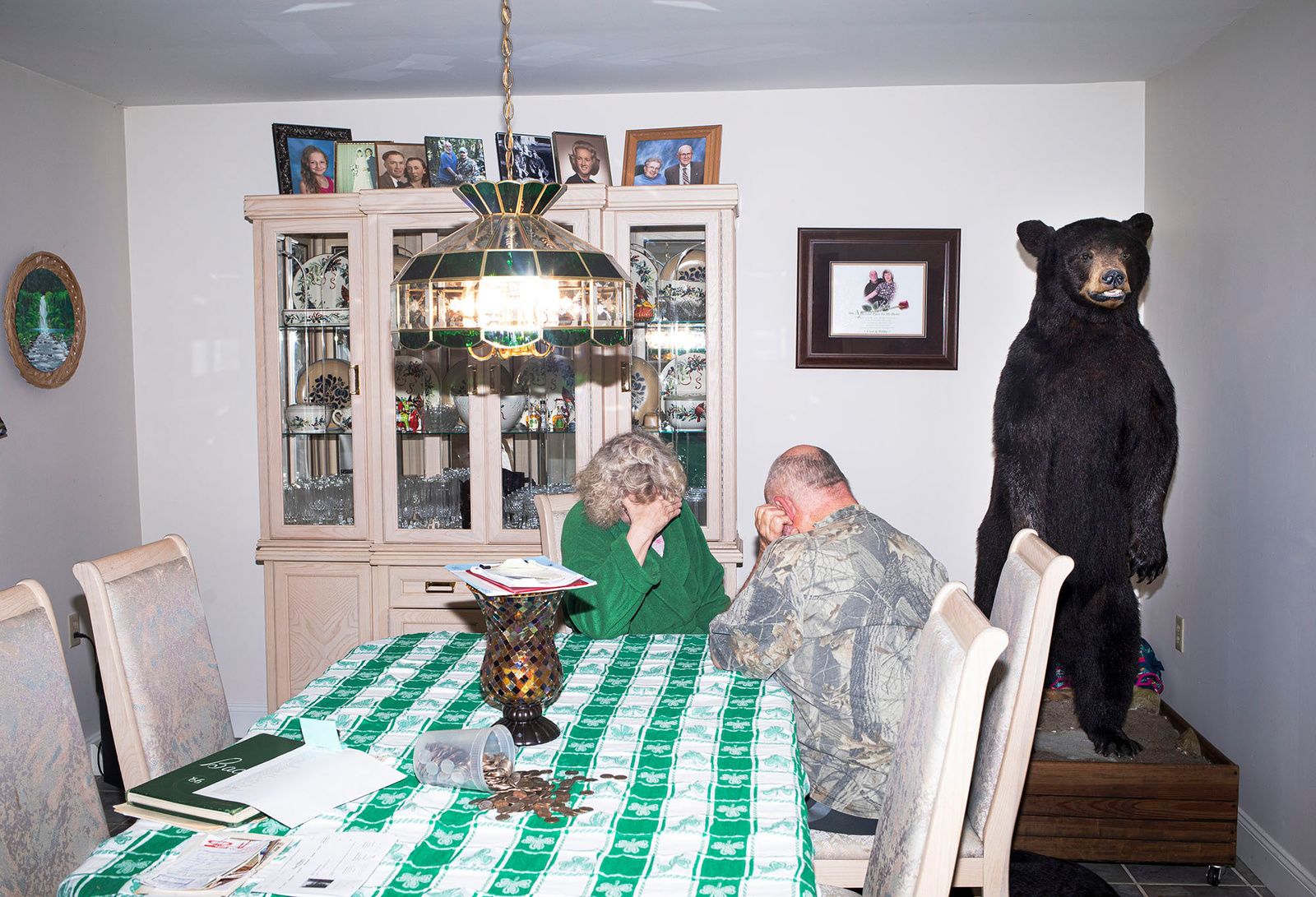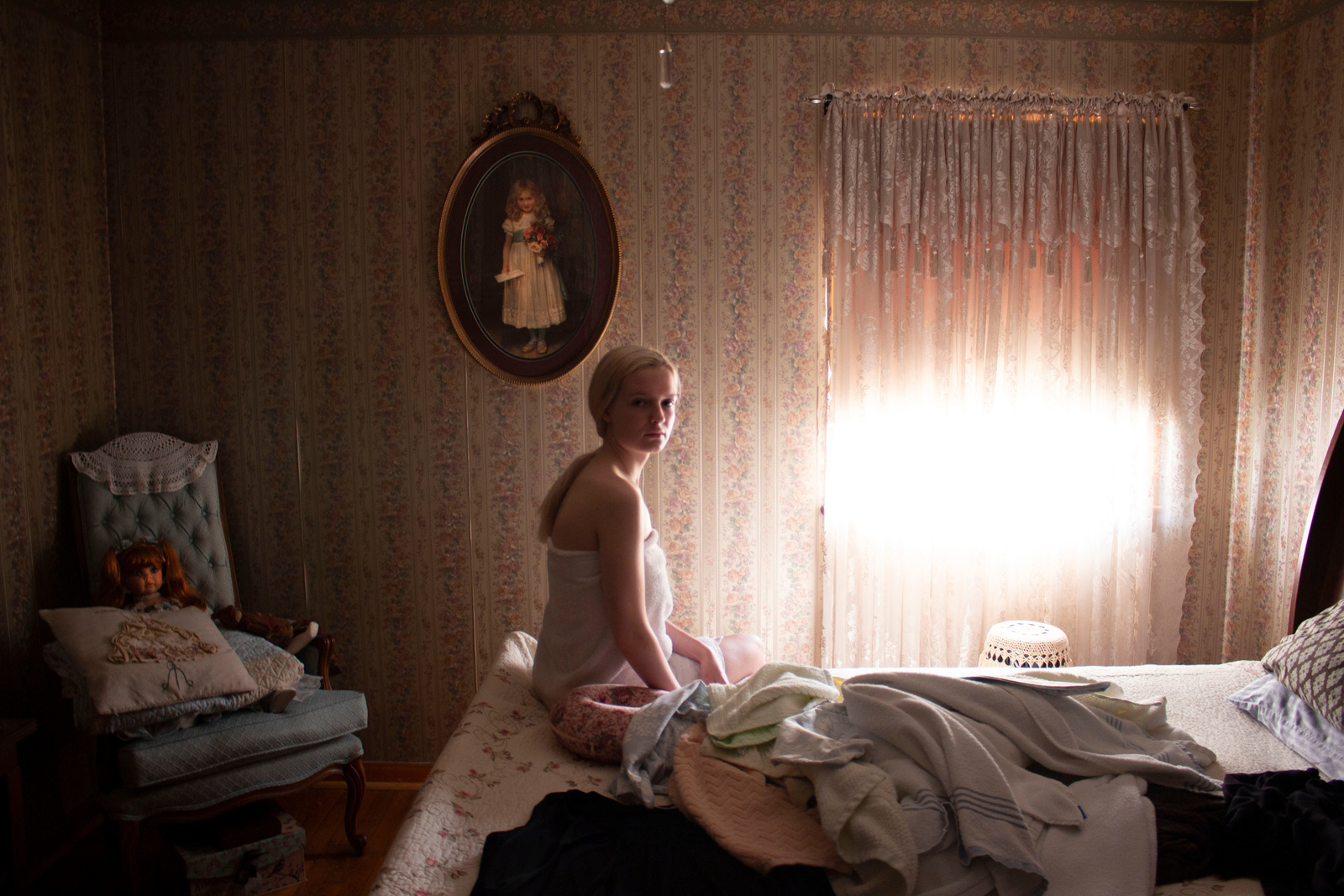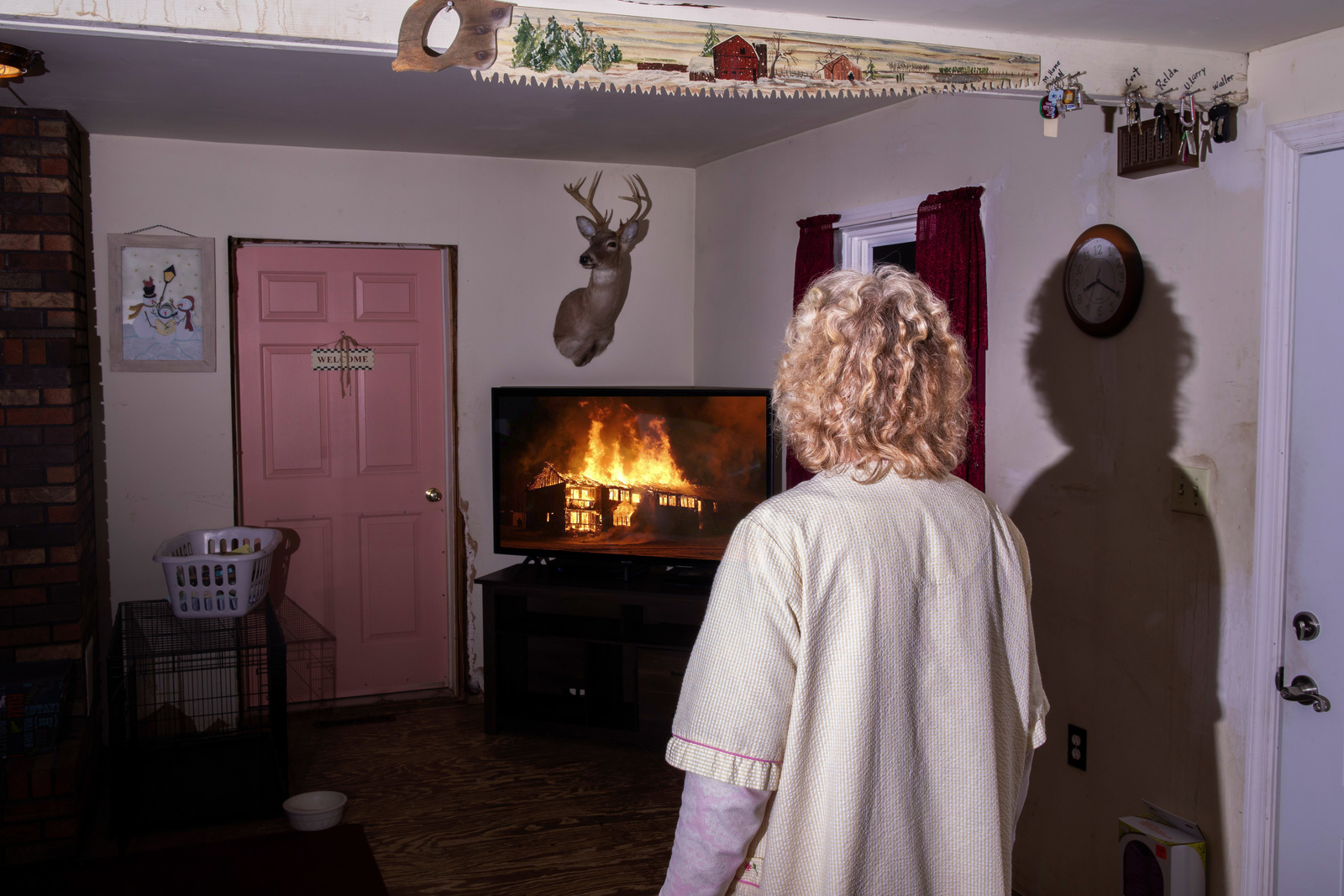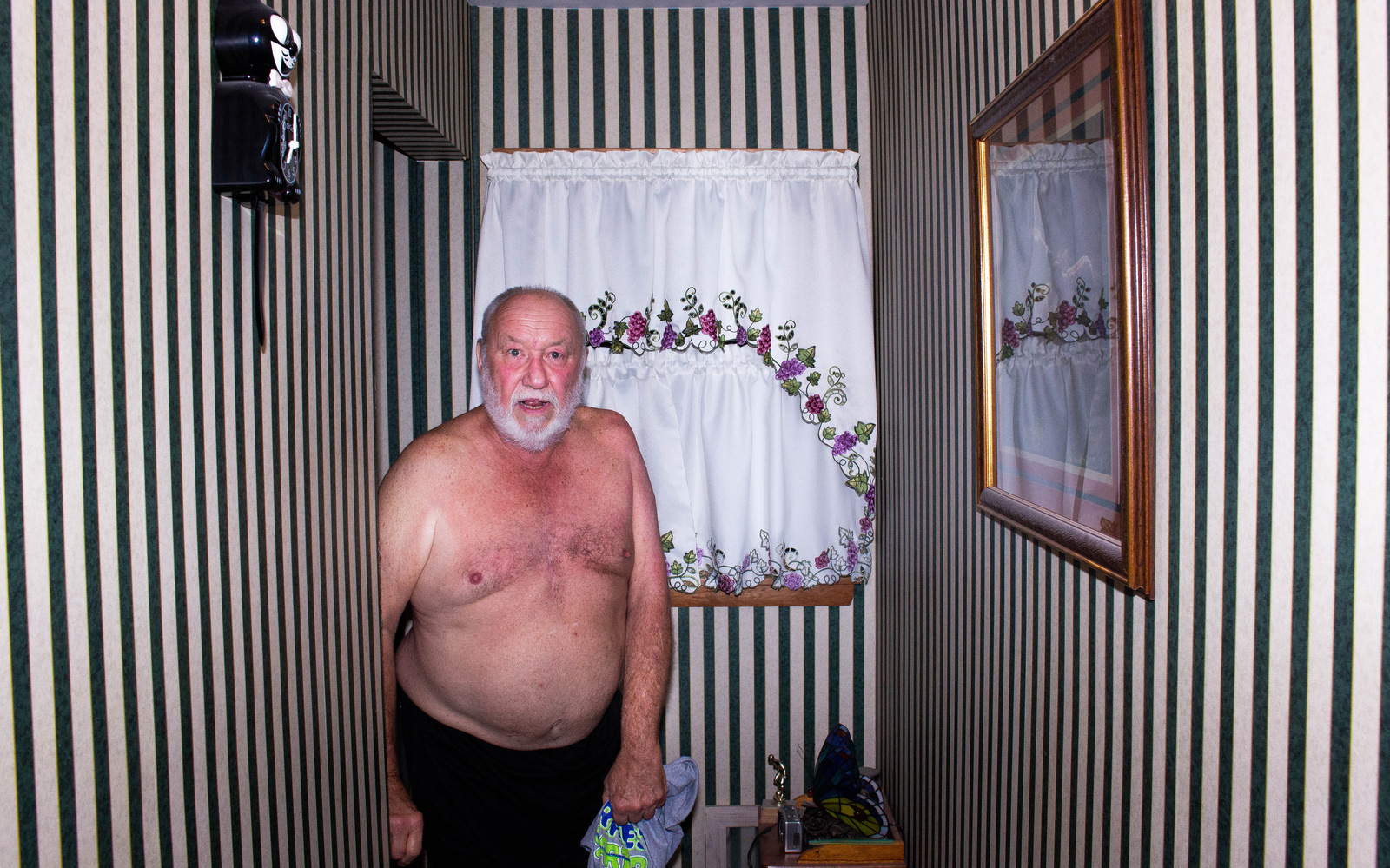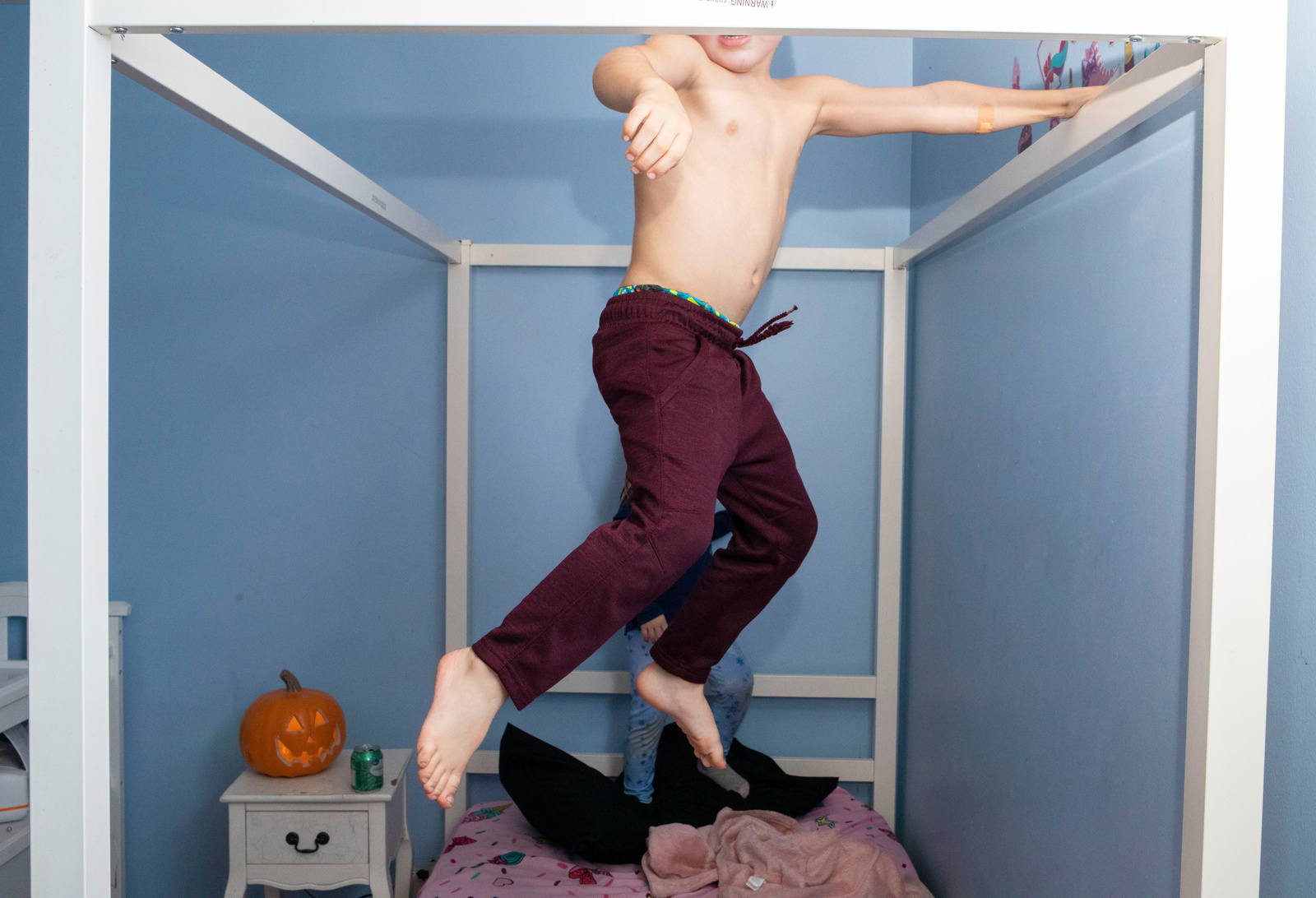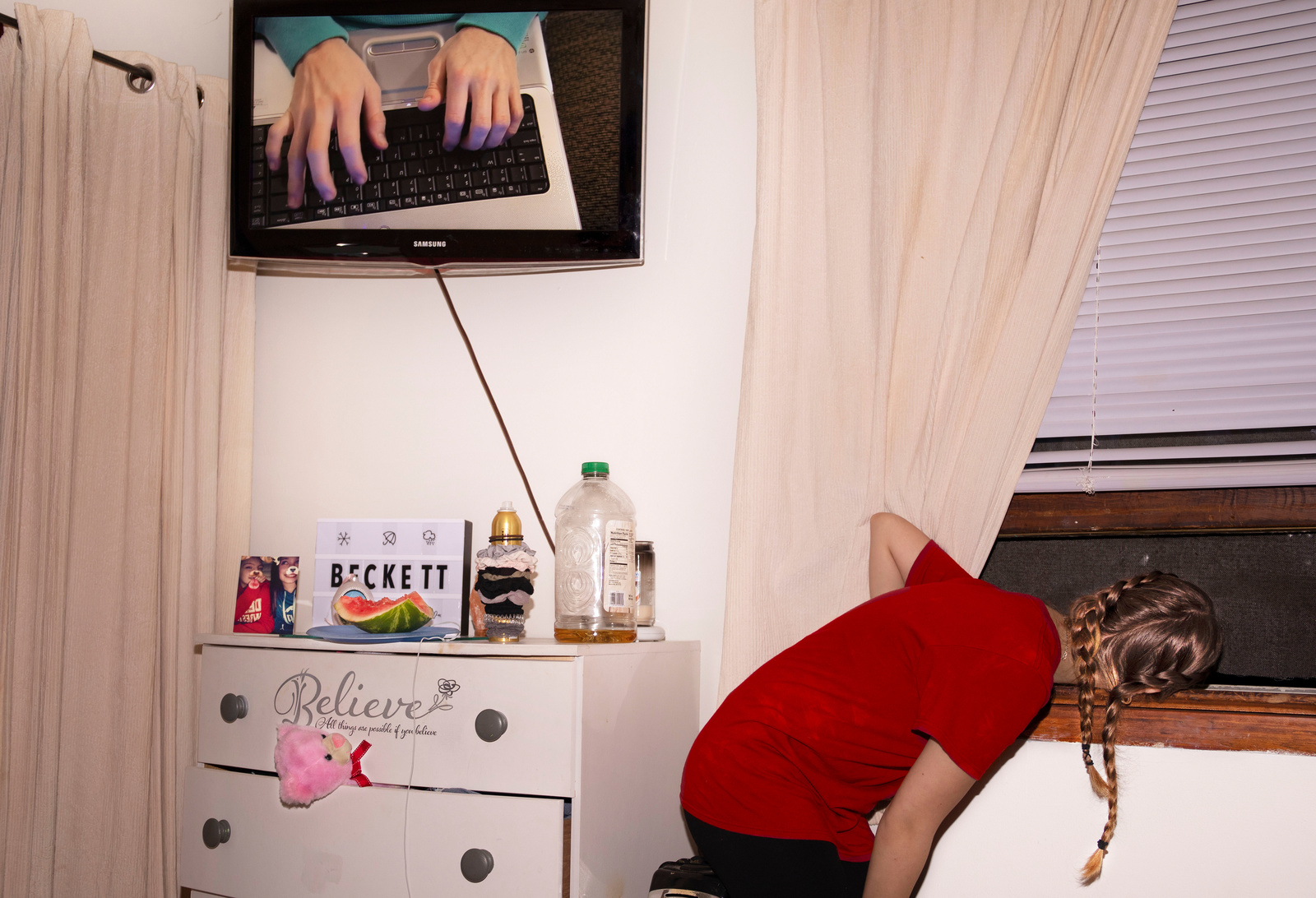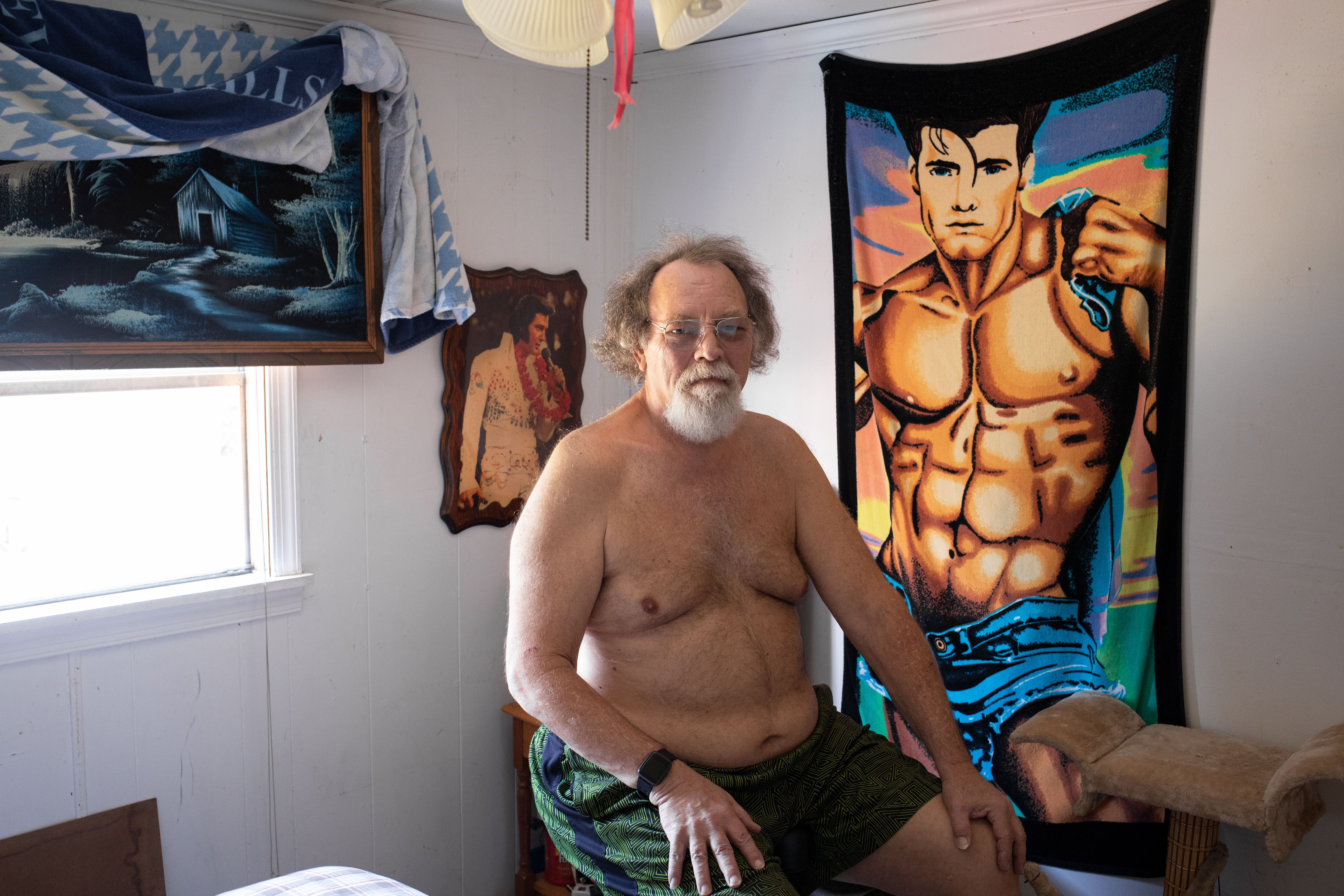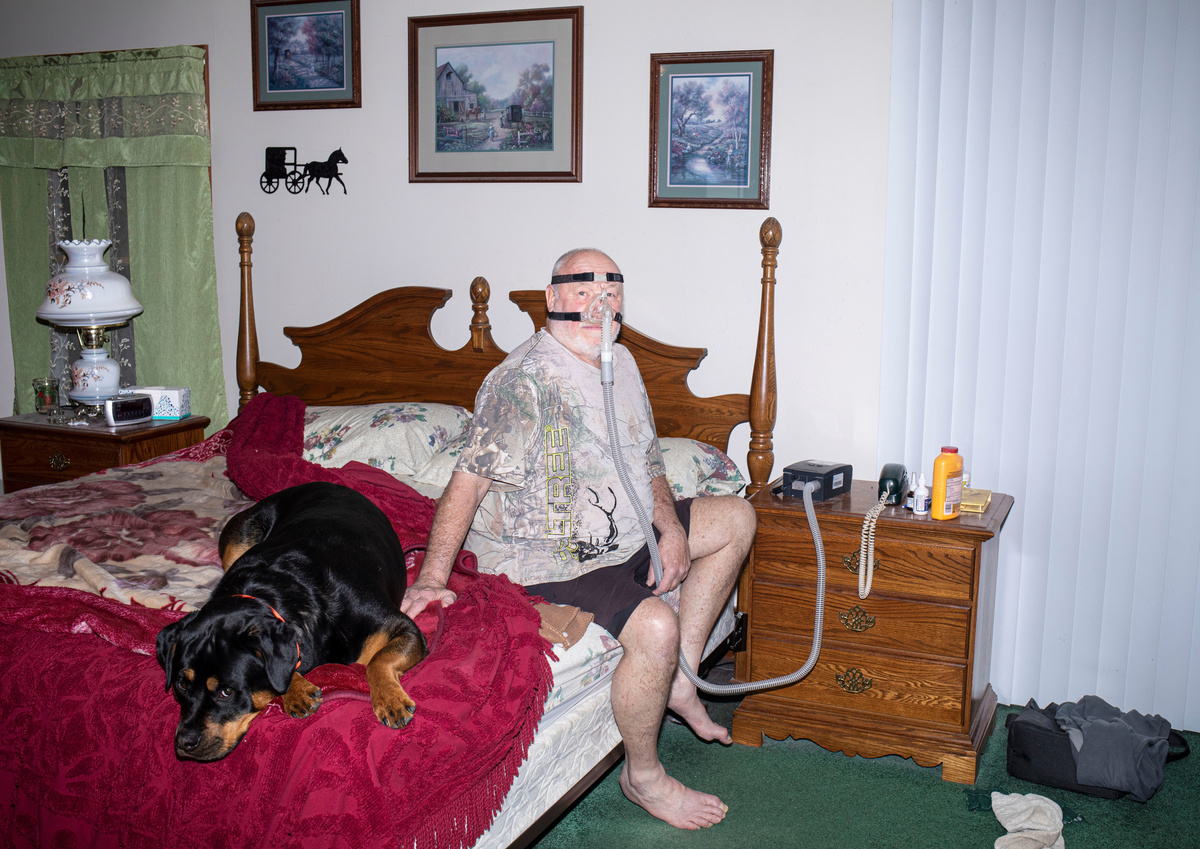When we spoke with the photographer Shaun Pierson, he was living and working in Ohio and taking photos of strangers he’d met on Craigslist. Pierson’s photographs are grounded in the half-vacant spaces abound in rural America which he uses as settings for his open ended narrative portraits.
His 2019 body of work, entitled Alvine Road, explores nostalgic yearning for a past otherwise marked by distress.
![]()
Self Portrait
Do you have a Rose & Thorn for this week?
I was an RA in college, so I should be very familiar with icebreakers, but I'm so bad at them. My rose from this week is that I went to a church and I made a really fucking cool picture that I didn't think that I was gonna be able to make. For my thorn, I don't know. I feel like so much terrible shit has happened this week, but I can't pick something out.
So you moved to Ohio recently. Have you been able to continue to photograph during quarantine?
Weirdly enough, until maybe four months ago, I'd only ever had experience photographing my family members or immediate friends, so I wasn’t familiar with photographing people in new places, or just being in new places in general. I got into grad school in March, and once I found out that I got into grad school, I was like, “Okay, well, now it's real,” I had to branch out and start to work with people that I would never otherwise think of working with. I feel good that my practice is going to grow anyway. I just decided to start searching for people on Craigslist and started casting people in pictures and reaching out to as many people as I possibly could. I always think it's gonna be really hard for me to work with new people, just because I have a lot of anxieties around even meeting new people, but it's actually been really good. I've definitely been able to make work in Ohio, for sure.
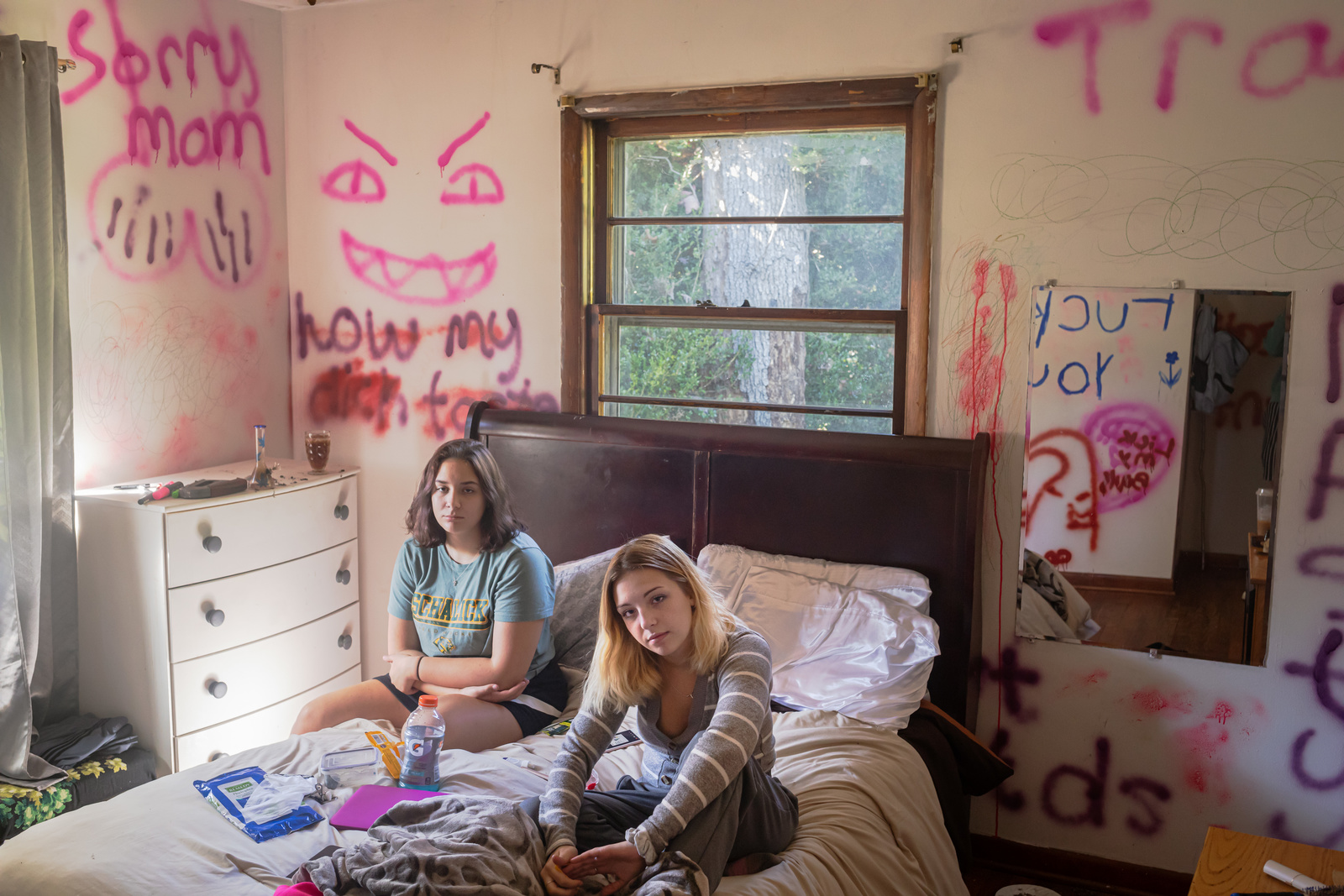
Sorry Mom
Is the specific place that you're working in a big factor to your current projects, either personally or with the subjects?
I don't think the place really has much of an impact because I'm not a documentary photographer in the sense that if I traveled to New Orleans, then that work would be about New Orleans or something. I like to stage a lot of my work, so location is important to me, but the specifics of the city don't matter so much.
You were saying that you’re working with new people outside of your family, and you posted the photo of Bill. Would you consider showing the photos along with information about these people?
That's a really good question. I know a lot of people who use text with images to give some context to the picture. In my experience, I think that with photography, or the way that I prefer to look at it, is that the image should stand on its own without any supporting text. The image should be strong enough to work without any explanation. But I think it would depend on the project. I think if I were working on a documentary project, maybe one that was very specific to something, then I would explain it somehow.
Can you give us a rundown of your process, from shooting out emails to choosing a location, etc.?
With my family, it was a lot easier because everyone is so readily available. I could pull people and do things very, very last minute. There wasn't a ton of planning that went into it. Also, with my family, I shot in a lot of locations that I grew up in, so I was really familiar with the logistics of location and how the light was going to look. It was a lot easier.
With people that I'm working with for the first time, I will post an ad on Craigslist or something. Craigslist is actually really fantastic for finding interesting people. I like people who are “real” looking or look like they have experience in life. Usually, the toughest part is finding a location because I'm not someone who can just go to a public park or something and shoot there, I need to research the location.
So I've been reaching out to a lot of historical societies that have these preserved Victorian mansions around here [in Ohio] that have been letting me shoot there. So far, I’ve shot in a few of those mansions, and I also reached out to a church who let me come for two days. I told them that I wanted people in the pictures, and they were like, “we can ask 15 of our members to stay behind and pose for you in a picture if you want.” I just got lucky. I get lucky every single time I find a location.
With people that I'm working with for the first time, I will post an ad on Craigslist or something. Craigslist is actually really fantastic for finding interesting people. I like people who are “real” looking or look like they have experience in life. Usually, the toughest part is finding a location because I'm not someone who can just go to a public park or something and shoot there, I need to research the location.
So I've been reaching out to a lot of historical societies that have these preserved Victorian mansions around here [in Ohio] that have been letting me shoot there. So far, I’ve shot in a few of those mansions, and I also reached out to a church who let me come for two days. I told them that I wanted people in the pictures, and they were like, “we can ask 15 of our members to stay behind and pose for you in a picture if you want.” I just got lucky. I get lucky every single time I find a location.
Sunday Morning
Your project, Alvine Road (2019), is set in New Jersey, right?
Yeah, it's a road that I grew up around. For the most part, my aunt and my cousins currently live on that road. It's where I spent a lot of time so it was really important to me.
Do you see your future projects pulling from what you’ve done with Alvine Road or are you interested in stepping away from what you explored there?
I'm interested in so many things. That's what I'm struggling with now, just finding one project or one way of making things that I can sustain since I'm coming from photographing my family, and I'm interested in photographing all of these other things. I'm trying to distance myself as much as I possibly can. I do like to stage my pictures and that's something that I'm trying to move away from a bit but I am really interested in documentary photography, because so in the moment, and you really have to approach people, and you have to constantly be talking to people; it's not a way of working that I'm super familiar with.
The thing is, when I get to Yale in August, they're going to tell me to change it up completely. I don't think I’ll really have a choice, I'll definitely have to distance myself as much as I possibly can from the work that I'm currently making now. But I do think that it all comes full circle–everything informs something else. I'm sure it will be a similar style, but I’m definitely looking to switch it up.
The thing is, when I get to Yale in August, they're going to tell me to change it up completely. I don't think I’ll really have a choice, I'll definitely have to distance myself as much as I possibly can from the work that I'm currently making now. But I do think that it all comes full circle–everything informs something else. I'm sure it will be a similar style, but I’m definitely looking to switch it up.
![]()
Aidan
You shoot digitally?
I only shoot digitally, which is something that no one can wrap their head around in photography. Film is making such a huge comeback, but I can never get the hang of it. I prefer to have all the control that I possibly can. With film, you have to take a chance, and I'm not ready.
Maybe that'll be your grad school switch up!
I was thinking of a nice large format.
Do you feel like the camera helps you to connect with the subjects in a way that you normally wouldn’t be able to? Does it act almost like a mask?
It's not really a mask, because the connection is still really genuine, which I think is important. It's really important for me to make the people that I'm photographing aware of my intentions and to make them feel as comfortable as possible. Photography has definitely helped me get a lot more comfortable speaking with people.
“It's not really a mask, because the connection is still really genuine, which I think is important. It's really important for me to make the people that I'm photographing aware of my intentions and to make them feel as comfortable as possible. ”
Especially during undergrad of college I was just terrified of socializing with people on the level that I am now. I think photography has definitely helped with that, because you're sort of forced to go out of your way, otherwise, you're not going to make anything. I think the feeling of not making anything or missing out on the picture that you could have made is so much worse than anything.
There's something intriguing about your usage of light, specifically flash. I think that this lends to the image looking extra staged, there's more of a distance between the viewer, the camera, and the subject. Is this something that you’re thinking about while using flash?
That was something that I struggled with during Alvine Road, finding this cohesive style that really worked because I really do love natural light, and this very cinematic style of lighting that you don't really get with flash. I mean, you can get it with flash, but not the flash that I was using in that body of work, which is this very abrasive, very bright way of lighting.
I used to use flash a lot at night, because obviously there's no light and my camera doesn’t work in really low light. It was more about trying to light the image properly than really saying anything by using the flash.
In my newer work I'm using flash in every single picture but it's off-camera flash, so it's not abrasive. It's really beautiful. It's a really cinematic style of lighting that I find lends itself better to the picture than the style of flash that I was using before. I think I'm a lot more thoughtful with it now.
I used to use flash a lot at night, because obviously there's no light and my camera doesn’t work in really low light. It was more about trying to light the image properly than really saying anything by using the flash.
In my newer work I'm using flash in every single picture but it's off-camera flash, so it's not abrasive. It's really beautiful. It's a really cinematic style of lighting that I find lends itself better to the picture than the style of flash that I was using before. I think I'm a lot more thoughtful with it now.
![]()
House on Fire
It seems like you enjoy these domestic and rural aesthetics, like a midwestern feel. Do you see that really changing? Or is that something that's really important for you?
I don't see that changing at all. I moved to New York the day of my undergrad graduation, and I didn't make work for six months or something. Moving to New York for the first time is such a huge adjustment, and even for someone who's not a photographer, it takes so fucking long to get acquainted with the city. To get in the headspace was something that I could never quite do as a person.
Then, when it came to making work, I'm in a city, and I'm not interested in the city, and I'm not interested in taking pictures in the city. That was really difficult; I had to travel back home to Jersey, which is South Jersey, so it's really rural, it might as well be fucking Alabama or something.
Then, when it came to making work, I'm in a city, and I'm not interested in the city, and I'm not interested in taking pictures in the city. That was really difficult; I had to travel back home to Jersey, which is South Jersey, so it's really rural, it might as well be fucking Alabama or something.
“I grew up around a lot of farmland, and I think that the people in rural areas are always really interesting, or at least interesting in ways that people in the city aren’t to me.“
I've always been drawn to rural landscapes because it's what I grew up around. I grew up around a lot of farmland, and I think that the people in rural areas are always really interesting, or at least interesting in ways that people in the city aren’t to me.
I'm interested in rural areas visually as well. They are a lot more dynamic and a lot more interesting. New York City has so many interesting people, and it's so beautiful, but from a photographic perspective, I feel like I've seen everything. Rural areas offer a lot of mystery that is really interesting and something that I can't get in a city.
You’ve mentioned film in other interviews and there is a definite cinematic quality to your work. Is there also a narrative to the series of photographs?
I usually take a bunch of pictures and then it somehow weirdly ties in together later because I think when you're photographing something, you're always subconsciously thinking of something else. When I started Alvine Road, I started taking pictures of my family which I thought was just out of convenience, because everyone's so readily available, and then it took my professor coming to me and saying, “these pictures are just as much about you as they are about the people in them.” Then it all started to click and make sense and that started to inform the later pictures that I was making.
With these new ones, I feel like it'll be the same thing. I just make what I feel like making at the moment. Usually, it also takes a lot of critique, which I really like. I like getting feedback from people,that's something that's really important to me. It's something that's always helped me to further discover what I'm interested in. I always need people to push me in the right direction, and, once I'm in that direction, I can sort of tie it all together for what I'm making. For now, I'm just thinking of these pictures as standalone images, not quite part of a cohesive body of work.
With these new ones, I feel like it'll be the same thing. I just make what I feel like making at the moment. Usually, it also takes a lot of critique, which I really like. I like getting feedback from people,that's something that's really important to me. It's something that's always helped me to further discover what I'm interested in. I always need people to push me in the right direction, and, once I'm in that direction, I can sort of tie it all together for what I'm making. For now, I'm just thinking of these pictures as standalone images, not quite part of a cohesive body of work.
![]()
Pop Pop in the Hallway
And what would you say is the narrative, if there is one, of Alvine Road?
I mean, the narrative of Alvine Road is my childhood, and growing up in this environment that was for sure less than nurturing. There is this cyclical nature of addiction and abuse, in general, and the complacency that everyone I grew up around was so was just so apparent from the perspective of a child. That was really important for me to sort of explore by photographing my family members in these locations from my childhood. The tumultuous nature of my childhood was something that was really important for me to look at.
There’s that self portrait of you and your high chair which seems to fit this context.
Self portraits have always been really hard, because I hate seeing myself on camera, but sometimes I think it's necessary–sometimes I'm just bored enough to do it. It's a lot harder for me to photograph myself than it is other people. I'm so much more interested in other people. I’m always so ready to facetune my entire fucking face, but then I have to stop myself because it wouldn't be honest at all, it would defeat the purpose of the picture.
How is the process of printing for you?
I hate looking at pictures on a screen, which is something that I really never used to care about. I've learned the importance of printing, and how different an image looks when it's hung up on a wall, and how much better it looks in person, but obviously I've had no choice but to be digital for the past year. I would love to print, but printing is so expensive. It's something that I need to get better at, and I'm hoping that I will in grad school, because you can really do whatever you want, and they have a lot of equipment.
What’s the drive for going to grad school (besides the resources)?
Grad school is something that I really didn't think about. It was something that was brought up to me by my former professor, Danna Singer. And she graduated from Yale’s MFA program in 2017. She was also my introduction to photography as a whole. So that was really interesting.
I thought about it for a couple years before I really decided to get serious about it and decided to start preparing to apply. I feel like in grad school, aside from the resources, there's this sense of community that I feel is really difficult to get elsewhere. Just to be working around so many talented people, and to have this constant exchange of ideas, is something that's really special. I think it's going to change my work massively. There's so many different perspectives at play, that I have access to, that I would never otherwise probably explore
I thought about it for a couple years before I really decided to get serious about it and decided to start preparing to apply. I feel like in grad school, aside from the resources, there's this sense of community that I feel is really difficult to get elsewhere. Just to be working around so many talented people, and to have this constant exchange of ideas, is something that's really special. I think it's going to change my work massively. There's so many different perspectives at play, that I have access to, that I would never otherwise probably explore
![]()
Jump
There’s a great breadth in the treatment of light in your photographs. How do you use light to drive a narrative?
Light is something that I've just always been really interested in. I grew up as a massive film lover. I remember watching David Lynch and I think what's so important about films like Mulholland Drive is the visual aspects of it, the color and the way that it all works so well together. One of my favorite movies, the Wizard of Oz, clearly one of the first movies I watched, is definitely one of the most beautiful films ever made.
“One of my favorite movies, the Wizard of Oz, clearly one of the first movies I watched, is definitely one of the most beautiful films ever made.”
Color has always been really important to make a pretty picture, because I've always been interested in just visually appealing images. This is something that I'm sort of trying to get out of, because it can sometimes cloud my judgment. There's so much more to photography than pretty pictures. I don't really know any other way of working aside from with color. I'm trying to get into black and white.
Do you feel like he would lose a lot of what attracts you to the images if you were to work in black and white?
I don't think so, I think that I would just really have to find a way of working that really serves working in black and white. I feel like I could work in black and white, I love and appreciate black and white; I just have to learn to see things in black and white. In order to work in black and white, you really do have to see in black and white, it’s about tones. Lighting might be more important in black and white than it is in color since you have that lack–it’s all about tones.
Does this allegiance to color have to do with who or what you're photographing? I've been looking at a lot of pictures from the Pictures Generation, Cindy Sherman and Jimmy De Sana, and they're all about this certain de-contextualization. Your work seems to be very rooted in context.
I remember my childhood being so colorful, and these places that I grew up around, the colors of the rooms and the wallpaper, especially at my grandparents house where everything's clashing. It might not be satisfactory to an interior designer because it really doesn't work together, but it's something that's always been very, very interesting to me and I've carried with me into adulthood. I love wallpaper, I love clashing patterns, I love all of the shit that looks so ugly to so many other people.
Color was really really important for me to work with, especially if I'm shooting these people and in these places that I grew up in and around because that's just what I remember from my childhood. All of these amazing colors were contagious, and it's something that I never appreciated until I started taking pictures. These places that I grew up around didn't really register with me until I brought my camera out and I was like “oh my god wait like this place is so fucking weird.”
Color was really really important for me to work with, especially if I'm shooting these people and in these places that I grew up in and around because that's just what I remember from my childhood. All of these amazing colors were contagious, and it's something that I never appreciated until I started taking pictures. These places that I grew up around didn't really register with me until I brought my camera out and I was like “oh my god wait like this place is so fucking weird.”
![]()
Briana in Ohio
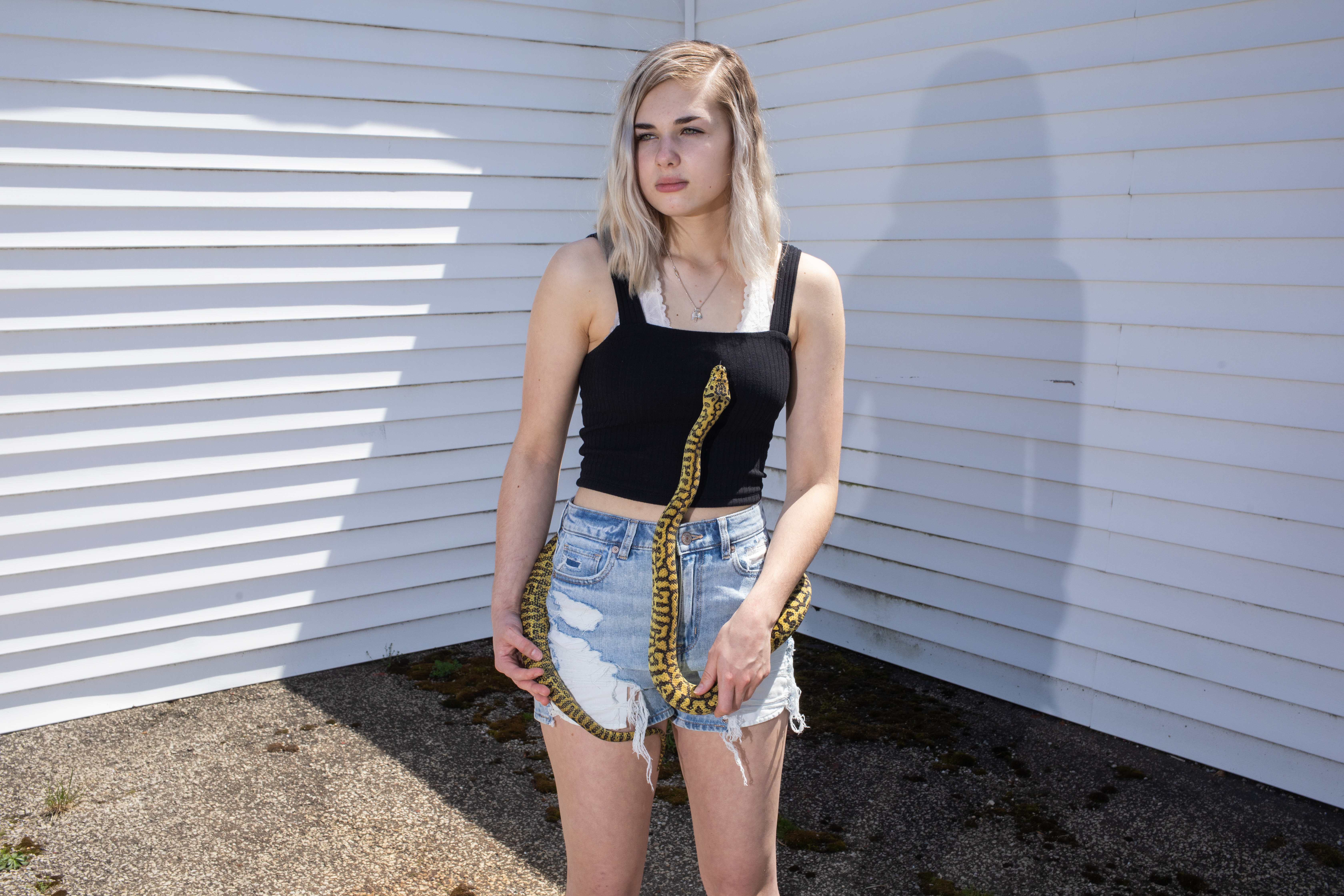
Briana in Ohio
Your work does have a lot to do with a kind of nostalgia, whether that's in the subjects or even in the place. Do you feel that this is going to remain central to your practice? On your instagram you have “Brianna in Euclid, Ohio,” and there is even some sense of nostalgia there, even though it's someone you don't know, and it's in a new location.
Nostalgia is a good word for it because it's something that has informed my work from the very beginning. It's like the basis for Alvine Road. I definitely feel like it's probably going to inform everything I make for the rest of my life. My childhood is so important to me, as so many peoples’ are. I'll carry that with me throughout the rest of my life. Even if I'm not directly related to the picture, like Brianna in Ohio, or like the rest of the photos I'll be making, something will always be calling back to, maybe, a film that I saw in my childhood or something like that. Movies that I saw in my childhood are really, really important to me, and they've sort of shaped the visual language that I have today without a doubt.
There’s this photo in which a young girl is peering out of a window, and on the dresser there’s a sign that reads “Beckett.” Can you tell us about that photo? There’s so much suspense, it intimates action without actually showing it.
I don't know what she's looking at. I've always been really interested in experimenting with absurdist imagery to a certain degree. So I really wanted it to be a bit absurd, in a way, with her braids and her strange gesture, the way that the teddy bear’s head is cut into the drawer. That photo was one of the first times I really departed from this really beautiful natural light, in favor of this really harsh flash. It’s this very odd way of making a picture that I'm sort of carrying over into what I'm making now.
I do love that picture, which for me is about shame, 100%. That's something that plays a huge part in that body of work. I also like not showing people's faces a lot. I'm always looking for a certain level of tension in every picture that I take, even if it's a photo of one person, in order for it to be interesting to me, there needs to be something happening– some tension.
I do love that picture, which for me is about shame, 100%. That's something that plays a huge part in that body of work. I also like not showing people's faces a lot. I'm always looking for a certain level of tension in every picture that I take, even if it's a photo of one person, in order for it to be interesting to me, there needs to be something happening– some tension.
![]()
Believe
Do you think that not showing faces is a way of broadening the meaning of the photograph?
It adds a lot of mystery to the photo, which is something I'm interested in, because I feel like if you're too direct, then the picture just becomes too obvious; someone can figure it all out immediately. I think of a photographer like Gregory Crewdson, or something, who often has people staring off into the distance and these really elaborate tableau vivant style photographs. You want people to sit with the image, and try to figure it out, and have different interpretations of it. If everyone has the same interpretation of every single picture I make, then it's not really successful.
Even when you do include the faces, there's definitely a stillness that's imparted by the settings and the lighting, and the subjects’ poses convey a sense of emotion. I found it interesting that they tend to have less expressive emotions on their faces.
I have recently had people laughing and smiling. They're not happy pictures, but I think that's what makes the pictures. It's like, why is this person smiling in this motel room full of blue balloons?
I've always had people keep their expressions sort of blank, because I was worried about being too on the nose–I'm not going to have someone crying in a picture to represent sadness or something–I think it's really just trying to find that middle ground, where they're being expressive enough to not be a completely blank slate, but they're not being overly expressive to the point where it's it's too much.
I've always had people keep their expressions sort of blank, because I was worried about being too on the nose–I'm not going to have someone crying in a picture to represent sadness or something–I think it's really just trying to find that middle ground, where they're being expressive enough to not be a completely blank slate, but they're not being overly expressive to the point where it's it's too much.
![]()
VR
Do you find that people connect with the photographs you're making of them? Have there been people who feel like they don't represent them well?
This was a huge problem when I was photographing my family, more so because they were very concerned about how they were going to be represented. At a certain point, they're also very aware of this lifestyle that they live. It's very obvious that the work is about class to a certain degree, but I never wanted them to feel like I was making fun of them or trying to exploit them in any way. While I feel like photography is naturally exploitative, I think it's just how you approach it. I have a cousin that doesn't speak to me anymore because I tried to photograph a piece of fly tape in his bedroom. I asked him to stand in front of the fly tape and I think that maybe he thought that I was equating him to trash or something. That was really difficult, and it taught me that if someone doesn't get it, then they're just not going to get it; I'm not going to force that picture to happen.
With people that I work with now, I show them the picture and I tell them the photo that I'm taking, because I never want to mislead them in any way or try to make them look a certain way that they're not comfortable with. I always say that I’ll send the pictures and that I'll show them in the moment as well. I know a lot of people who don’t do that, and I get it, because sometimes you might feel like you have to trick people to get what you want.
With people that I work with now, I show them the picture and I tell them the photo that I'm taking, because I never want to mislead them in any way or try to make them look a certain way that they're not comfortable with. I always say that I’ll send the pictures and that I'll show them in the moment as well. I know a lot of people who don’t do that, and I get it, because sometimes you might feel like you have to trick people to get what you want.
![]()
Bill in New Jersey
“I always talk to people though, before taking their picture, or I will sit down with people for hours, because I feel like that conversation preceding the photo is so important.”
The people that I've worked with, aside from my family, have never had an issue with the way that I've portrayed them at all. They've always been very comfortable. I always talk to people though, before taking their picture, or I will sit down with people for hours, because I feel like that conversation preceding the photo is so important.
I wouldn't have been able to get Bill shirtless, in his bedroom in front of that beach towel if I hadn't sat down with him for three hours and talked to him and got to know him as a person. I was walking through a trailer park in New Jersey, and he was outside, we got to talking, and he invited me into his house. I thought, “alright, this is the end.” I've been going into so many random people’s houses, and the pictures are too important for me not to do it. I meet people on Craigslist and ask them if I can come into their houses to take their picture. This one guy let me come into his house and photograph him naked. It was really terrifying, just because he was very strange, but it turned out to be really good.
![]()
Bill in New Jersey II
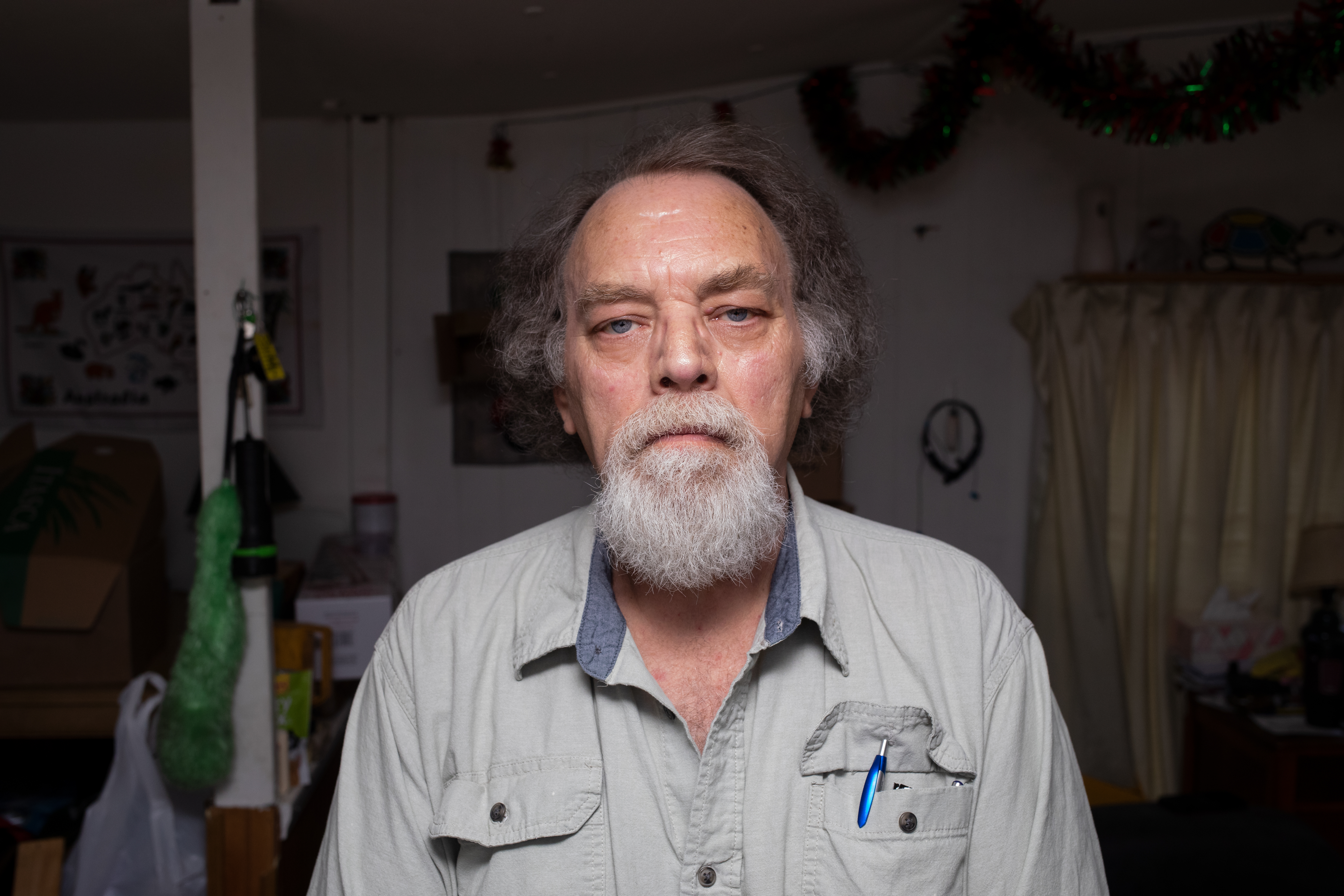
Bill in New Jersey II
Do you think that these photographs are collaborations in a way?
I do, at least in the successful pictures I've gotten. I take a lot of really bad pictures. Sometimes I'll meet somebody and they're just not able to give me what I want, no matter what I say; it's just not in their face, their body is too stiff, etc. This is a collaboration for sure, in that sense. I mean, all of the good pictures that I've gotten of people, the people have made those pictures 100%, or the location, you know. So yeah, collaboration is something that's important to me. And it's something that I used to think that I would hate, because I really don't like working with people. Right. But I think when I'm photographing them, it's completely different. Where if I was like, on a film set or something, because I went to college for film, like it's insufferable, because many people Yeah, what's college like? Like, everyone's in film major, because they think it's easy. So like, nobody cares. Yeah, that always sucked. But I like working a lot, too.
![]()
CPAP
Is there a correlation between a successful image and a personal connection?
Photography is interesting because it's really not about making beautiful pictures. It's about what they mean to you and what the photos are about. I think what I find that separates really good artists from maybe not so good artists is that the really good artists will always have something important to say. I feel like having a personal connection to everything I make is super important, because if not, then it just feels shallow. Anyone can take a picture, anyone can take a really pretty picture.
Visit Shaun Pierson’s artist page.
︎: @shaun_pierson


